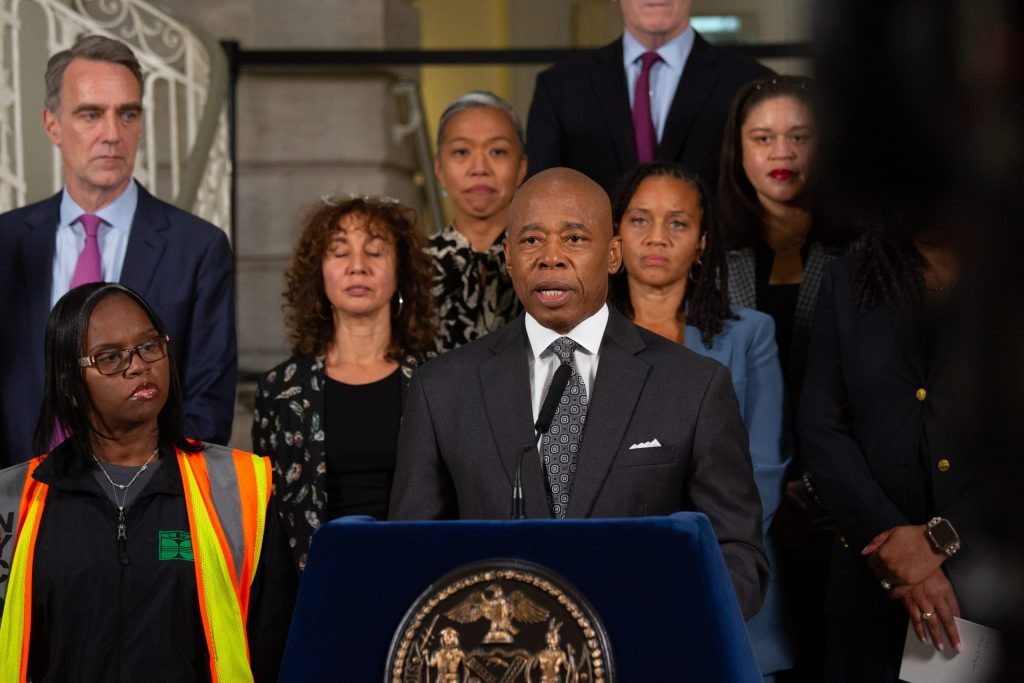As four separate federal investigations plague Mayor Eric Adams and his administration, progressive politicians such as Councilmember Tiffany Cabán (D-Queens), state Senator Julia Salazar (D-Brooklyn) and Assemblymember Emily Gallagher (D-Brooklyn) have called on him to resign.
Adams has steadfastly said he will not, but there’s also the possibility that he could be forced out.
If he were to leave office under any terms, he would be succeeded by the Public Advocate, Jumaane Williams, and a special election would be held to elect a new mayor.
How would this all shake out? Here are the basics:
How could Adams leave office?
Adams will either leave office voluntarily or against his wishes. If it’s voluntary, that means resigning.
Only two New York City mayors have ever resigned: Jimmy Walker in 1932, and William O’Dwyer in 1950.
But the New York City Charter — the document outlining all rules for city government — has changed in the last 75 years, and if Adams were to leave office today, it would trigger a new process for replacing him that has never been enacted before (more on this below).
Who has the power to remove the mayor?
Gov. Kathy Hochul has the ability to remove New York City’s mayor from office, but that power has never been used. In 2019 and 2020, former New York Gov. Andrew Cuomo faced calls to remove then-Mayor Bill De Blasio for campaigning for president and his handling of the COVID-19 pandemic, but did not act on those recommendations.
The second option for removing the mayor is an “inability committee.”
As laid out in the City Charter, the committee would be made up of the corporation counsel (aka City Hall’s lawyer, a position that is currently vacant), the city comptroller (Brad Lander, who is running against Adams for mayor in 2025), the speaker of the Council (Adrienne Adams), one deputy mayor (selected by the current mayor, in this case Adams) and the borough president who has served the most consecutive years in office (currently Queens Borough President Donovan Richards).
Once convened, the committee could vote to form a panel of the entire City Council, which could then vote to declare Adams temporarily or permanently “unable” to “discharge the powers and duties of the office of the mayor,” according to Section 10 of the Charter. To take that step, the Council would need at least two-thirds of its members to vote for removal.
What happens if Adams is indicted? Can he still serve?
Yes. According to election law experts who spoke with THE CITY, even if Adams were indicted, he could continue to serve as mayor unless the governor or the inability committee removed him.
What happens once he leaves? Who becomes the mayor?
Regardless of whether Adams were to leave office voluntarily or involuntarily, the next steps would be the same.
When the mayor resigns, the public advocate — in this case Willians — becomes acting mayor. If Williams were somehow unable to act as mayor, then Comptroller Brad Lander would be next in line.
Within three days of Adams leaving office, Acting Mayor Williams would have to announce a date for a special election for mayor to be held on the first Tuesday that occurs 80 days after the office has been vacated.
The special election would use ranked choice voting, where voters rank up to five candidates. If someone gets more than 50% of first choice votes, they win, but if not, the voting continues in rounds. Our explainer of ranked choice voting goes into the nitty gritty.
Since there wouldn’t be any primaries for the special election, it would be nonpartisan, meaning that all candidates would run as individuals without party affiliation. And it means that all voters regardless of party affiliation could vote, including registered Republicans, Democrats and Independents all together.
However, if Adams were to leave office within 90 days before the June primaries (so, after late March 2025) there would be no special election, according to the Charter. In that case, Williams would be acting mayor until the new mayor is elected in November, and then that person would immediately take office after the November election rather than waiting until January 1, 2025, when the mayor is usually sworn in.
What would this mean for the 2025 mayoral race?
If a new mayor were to replace Adams via a special election, they wouldn’t be in office for long: the official mayoral primaries will take place in June 2025, and the next mayor will be elected in November 2025. The specially-elected mayor would likely serve for less than a year.
Williams, and whoever wins the special election, would still both be eligible to run for mayor in 2025 — which would make the special election an important one to watch, as an incumbent mayor might have a better chance of pulling ahead in next year’s race.
City Council Minority Leader Joseph Borelli, a Republican from Staten Island, reportedly has said that he would enter the ring in a special election if Adams were to step down — though he said he wouldn’t run against Adams in the regular mayoral race.
A nonpartisan election could give Borelli a better chance at winning, since he would be a prominent (and likely solo) Republican up against a large pool of Democrats.
There’s nothing stopping others who have declared their candidacies for mayor in 2025 from joining the special election. Lander, who would be next in line after Williams to succeed Adams, is already planning on running for mayor in 2025, along with State Senator Zellnor Myrie (D-Brooklyn) and State Senator Jessica Ramos (D-Queens).

